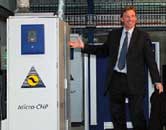
Ta-da!
The idea of combined heat and power – or cogeneration – has been around for a while, but harnessing it for domestic use is underexploited.
Marathon Engine Systems have tapped into this area and are now offering an Ecopower Micro-CHP (Combined Heat and Power) unit, which basically produces electrical power with a combustion engine. The heat – normally lost in vehicles and other engine-driven applications- is recovered from the generator, engine and exhaust system and can be used for local heating purposes.
It can easily heat a multi-family home, and larger buildings can be accommodated by installing multiple units. The noise level of a unit is less than 56 db(A), which is about as loud as a refrigerator.
The engine itself is of Swiss design, originally developed as a long lasting gas engine for heat pumps and CHP applications. Its been proven to last for 40,000 hours (thats about 10 years), with a service interval of about 4,000 hours – about a year under normal operation. You need to change the oil, spark plug and wire to keep it running in tip-top condition. The maintenance check cost is about $200 and takes about an hour. The permanent magnet generator is liquid cooled and maintenance free.
It is quite pricey but can recoup costs because you have considerable savings on heating. A unit costs $18,500 US, or just over 9,000, and discounts start at five units.
Standard installation costs are between $4,000 and $6,000 and require a licensed plumber and electrician. Newer installs are cheaper because of the planned spaces and needs.
Unfortunately, the Ecopower micro-CHP is not yet available to off-grid homes in the US, though Marathon Engine Systems are currently developing another design to make micro-CHP available off-grid. They hope to have the model available within the year.
What’s so neat about CHP is that, if you need only the heat, or the electricity, generated you can reap considerable rewards. Some states allow you to sell electricity back into the grid (check out your states policy on this), which means you can keep the engine running throughout the winter to, for example, keep pipes from freezing, and get something back to offset the cost of the unit. The excess heat can be used for a water heater when space heating isn’t needed.
In principle, you can even achieve trigeneration, or polygeneration, using the basic principles of CHP. Some of the excess heat can be used to power the cooling system in a refrigeration unit rather than have it running on electricity, though no domestic units are currently available.